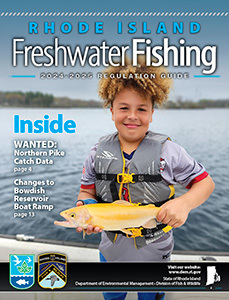Fishing Regulations
Diadromous Fish Regulations
- No person shall land, catch, take or attempt to catch or take any alewives (Alosa pseudoharengus) or blueback herring (Alosa aestivalis) from any fresh waters or marine waters of the State of Rhode Island. Possession of any alewives or blueback herring, at any time, is prohibited and shall be evidence, prima facie, that said herring was taken in violation of this regulation.
- No person shall erect any artificial obstruction/damming to fish passage in any stream or in any way alter the natural stream bottom to hinder the passage of fish.
Shad:
No person shall take any American shad (Alosa sapidissima) from the fresh waters of the state.
Salmon:
No person shall take any Atlantic salmon (Salmo salar) from the Pawcatuck River downstream of the Potter Hill Dam.
Smelt:
No person shall take any smelt (Osmerus mordax) by any means from any stream or river system in the state.
American Eel:
The recreational creel or possession limit for American eel (Anguilla rostrata) shall be twenty-five (25) fish per day, per person, either singular or in aggregate, and the minimum size shall be nine (9) inches from tip of snout to tip of tail. No person shall possess any American eel less than nine (9) inches in total length. No person shall take an eel from the freshwaters of the state unless in possession of a valid RI Freshwater Fishing License. There will be no closed season. No American eel may be commercially harvested from the freshwaters of the state and offered for sale without a valid commercial license per RI Marine Fisheries (RIMF) regulations. If harvesting commercially with a valid commercial fishing license from the freshwater of the state, fishermen must adhere to regulations as set forth in RIMF regulations Part VII (Minimum Sizes of Fish/Shellfish), section 7.16.1.
Fish Ladders:
- Trespass within or any obstruction of the entrance or exit of any fish ladder in the State is prohibited.
- For the purpose of regulating diadromous fishes, all fish ladders owned and operated by the state will be set aside as fish cultivation facilities pursuant to Rhode Island General Laws Chapters 20-12-1 and 20-12-5.
- Per General Laws Chapters 20-12-1, 20-12-4 and 20-12-5, fishing is prohibited within 1/2 mile of fish ladder mouth or outlet.

